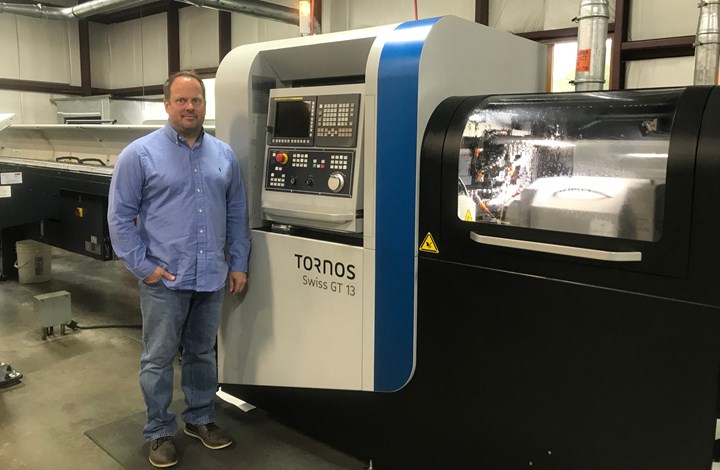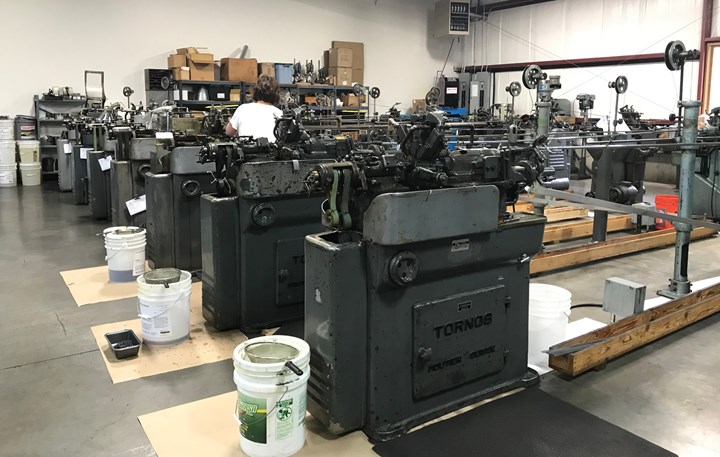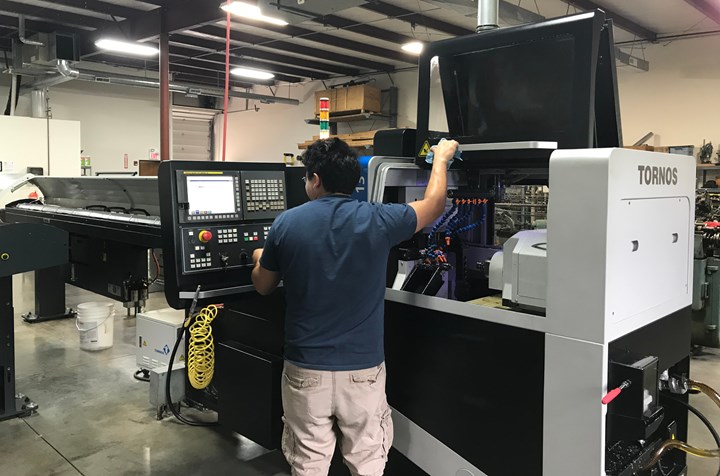When it comes to delivery of precision turned parts of the quality required by today’s medical, electronics, automotive and aerospace industries, sometimes the relationships a company can establish with both its customers and suppliers can make all the difference in the world. Here’s a company that has adjusted its strategy through time to nail down its best approach and has recently settled in with an effective growth plan backed by a lineup of Swiss-type machines that is delivering the goods.

Mike Gajewski has brought in two Tornos Swiss GT 13 machines and a Swiss DT 13 within an 18-month period. He is looking to add more Tornos equipment in the coming months.
Growing up ‘Swiss’
Founder and president of Minic Precision Inc., Mike Gajewski, grew up “Swiss,” working on Tornos cam-operated machines at the young age of 19. He was contacted for an apprenticeship by a local machine shop that operated Tornos cam machines. The apprenticeship turned into a full-time job, and he eventually worked his way up to the role of plant and production manager, where he remained for nine years. After nine years of experience in both engineering and managerial roles, Mr. Gajewski decided it was time to open up his own shop and meet the growing demand for the electronics and connectors industry.
In 1992, he rented a 2,000-square-foot space in Woodstock, Illinois, and purchased six Tornos and Bechler cam machines. He established his company to meet the growing demand for electronics assemblers requiring high precision contacts and guide hardware. He named his business, Minic, an acronym after his two sons’ names, Michael and Nicholas.
By 1995, he had filled his shop floor with 28 Tornos and Bechler cam machines. Some of the early Tornos cam machine purchases included M7s, R10s, and R125s. Even today, Minic still operates many of these original machines, and he is proud to have recently purchased three Tornos Swiss CNC lathes in the last 18 months.

Minic Precision was established as a traditional screw machine shop, at one time with as many as 28 Tornos and Bechler cam machines. Many of these machines are still in use at the shop today.
Growth and Relocation
Minic Precision has experienced growth and expansion through the years, resulting in the need to purchase and relocate to an expanded facility in Spring Grove, Illinois. Its quality control program and ISO 9001:2015 certification are major factors of the shop’s continued growth. According to Mr. Gajewski, his company’s true strength comes through in its motto: “Dedicated to providing the best quality and best value-added engineering and design.” The quality in the parts his shop produces on his Tornos machines represents his commitment to that statement.
Aside from quality management, value-added engineering is also what separates Minic from its competition, according to Mr. Gajewski. The company’s specialty is in micro-machined parts. When end users in stringent quality- and design-focused industries such as medical, electronics, automotive and aerospace bring their part requirements and prints, Minic facilitates smooth flow from design to prototyping and production. The company not only helps end users to select the best materials, but also offers expert machining and design processes to help realize the highest cost savings overall. This emphasis has helped Minic build key relationships with electronics assemblers, medical companies and defense contractors, along with customers in the automotive and aerospace fields.
Expanding the Machine Fleet
As the company began getting cross-over work that was better suited for CNC, Mr. Gajewski realized the need to expand his machine tool lineup to continue to provide higher cost savings over time and increased efficiency. Enabling quick turnaround time wasn’t 100% feasible or realized on the cam machines. In 2004, the company entered the CNC market with a mid-level Swiss-type lathe, but found that it was not up to par with the quality that has been the company’s driving success.
In 2015, Tornos released the Swiss GT series, designed to offer a complete standard equipment package at a competitive price. The machines are offered in three diameters, with a Y axis for increased machining capability in secondary operations. The 26- and 32-mm models can be fitted with as many as 40 tools, including 14 rotating tools, and the 13-mm model, which Minic brought on board, can take as many as 30 tools, including 12 rotating tools.
As Minic’s vision and goal is quality at the forefront of what it manufactures, the company needed machines that live up to the task. Its main purchasing strategy has always been investing in something that will go the long haul and be reliable, hold tight tolerances and provide quick chip-to-chip times. It was important to bring in a machine that could run more than 10,000 rpm on the main and counter spindles. With the Swiss GT series, Mr. Gajewski felt the long-awaited solution had arrived, so he scheduled his trip to the Tornos factory in Moutier, Switzerland, in the summer of 2016.
According to Mr. Gajewski, the tour of the production and assembly of the spindles and guide bushings and the overall Swiss manufacturing process from design to finish provided him a first-hand look at the level of quality that goes into manufacturing a highly rigid, stable and precise CNC Swiss lathe. It gave him the confidence to change over from his older Swiss machines to Tornos.
Mr. Gajewski says, “While other manufacturers may offer similar style Swiss lathes, everything from the weight of the Tornos machine to the way the spindle is built, and the durability of the Swiss GT 13 to cut tough materials, including the many exotic stainless steels we use, with no chatter, is a major win-win for Minic and sets us apart from our competition.”
In early 2018, Minic made its first Tornos CNC Swiss lathe purchase with the Swiss GT 13. Three months later, the company purchased a Swiss DT 13. The investment decision was an easy one, as Minic also purchased the TISIS software module to be used across both machines to facilitate the use of the same sets of tools. The modularity of the Swiss DT range was also a strong selling point.

The company's Swiss DT 13 runs side by side with the other Swiss CNC machines. TISIS communication and programming software facilitates the use of the same sets of tools for each.
Both machines manufacture connectors as well as other small parts. The parts handling with the vacuum extractor was a value-added benefit, especially, because Minic’s specialty is manufacturing sub-miniature parts. On these two machines, the company is able to run at higher rpm’s with beryllium copper, while still holding a 0.0001-inch tolerance. According to Mr. Gajewski, the CNC lathes allow him to achieve the necessary surface finish that previously was difficult to produce.
Software Brings Success
In addition to the two new equipment purchases, Mr. Gajewski says the purchase of TISIS, Tornos’ machine communication and programming software, has been a gamechanger for his business. The company’s production engineer, Raul Rodriguez, was able to easily learn the FANUC control simply by using TISIS. For example, through the software, he is able to put his tools in inventory, plug them into the job and schedule it right within the program. TISIS has been so easy to use that Minic has also recently purchased the Connectivity Pack for all its Tornos machines.
Continued Growth
Throughout the years, Minic has been committed to bringing in the best quality products. This approach has facilitated the company’s growth tremendously and has led to the ability to handle parts that it couldn’t before. Mr. Gajewski plans to continue to reinvest in the company and strengthen its position with additional equipment purchases.
In July 2019, Minic brought in its second Swiss GT 13, its third Tornos CNC lathe overall. In the coming months, Mr. Gajewski expects to purchase a SwissNano 7, which is designed to meet the demand for small workpieces requiring very high precision.
The entrepreneurial spirit and commitment to consistent quality has paid off at Minic and Mr. Gajewski as the company further solidifies its relationships with suppliers such as Tornos.
Minic Precision Inc. | 815-675-0451 | minicprecision.com | PMPA member since 2018
Tornos Technologies U.S. Corp. | 630-812-2040 | tornos.com
Related Content
Shop Optimizes its Swiss-Turning Flexibility
Paramount Machine uses various Swiss-type lathes, some with a B axis, to produce parts more effectively than it did on conventional chucker lathes. Today, nearly every job under 1.5 inches in diameter runs across those machines even if the batch size is a mere 5 pieces.
Read MoreDoes a Scanning Probe Make Sense on a Swiss-Type?
Swiss-types have limited tooling capacity, but there can be advantages to giving up some of that capacity to take advantage of a touch probe — in fact, a scanning probe — to enable in-process part measurements.
Read MoreShop Sets its Sights on Precise Tool Alignment
A Wisconsin shop has found that visual tool alignment technology has improved tool life and surface finishes for its Swiss-type lathes while increasing throughput as well.
Read More5-Axis Machining Centers Transform Medical Swiss Shop
Traditionally a Swiss machine shop, Swiss Precision Machining Inc. discovers a five-axis machining center that has led the company to substantial growth. (Includes video.)
Read MoreRead Next
Stretching the Limits with Swiss
This precision component supplier has high expectations when purchasing equipment. Customer requirements are intensifying, and its new technology must keep pace.
Read MoreSwiss-Type Lathe Helps Medical Shop Achieve Higher Precision
After the investment was made in a new Swiss-type lathe, not only was this company management’s expectations exceeded by the machine’s performance and efficiency, but the lathe is now included in plans for future applications.
Read MoreEmerging Leaders Nominations Now Open
Here’s your chance to highlight a young person in your manufacturing business who is on the path to be a future leader moving your company forward.
Read More









.jpg;maxWidth=300;quality=90)












